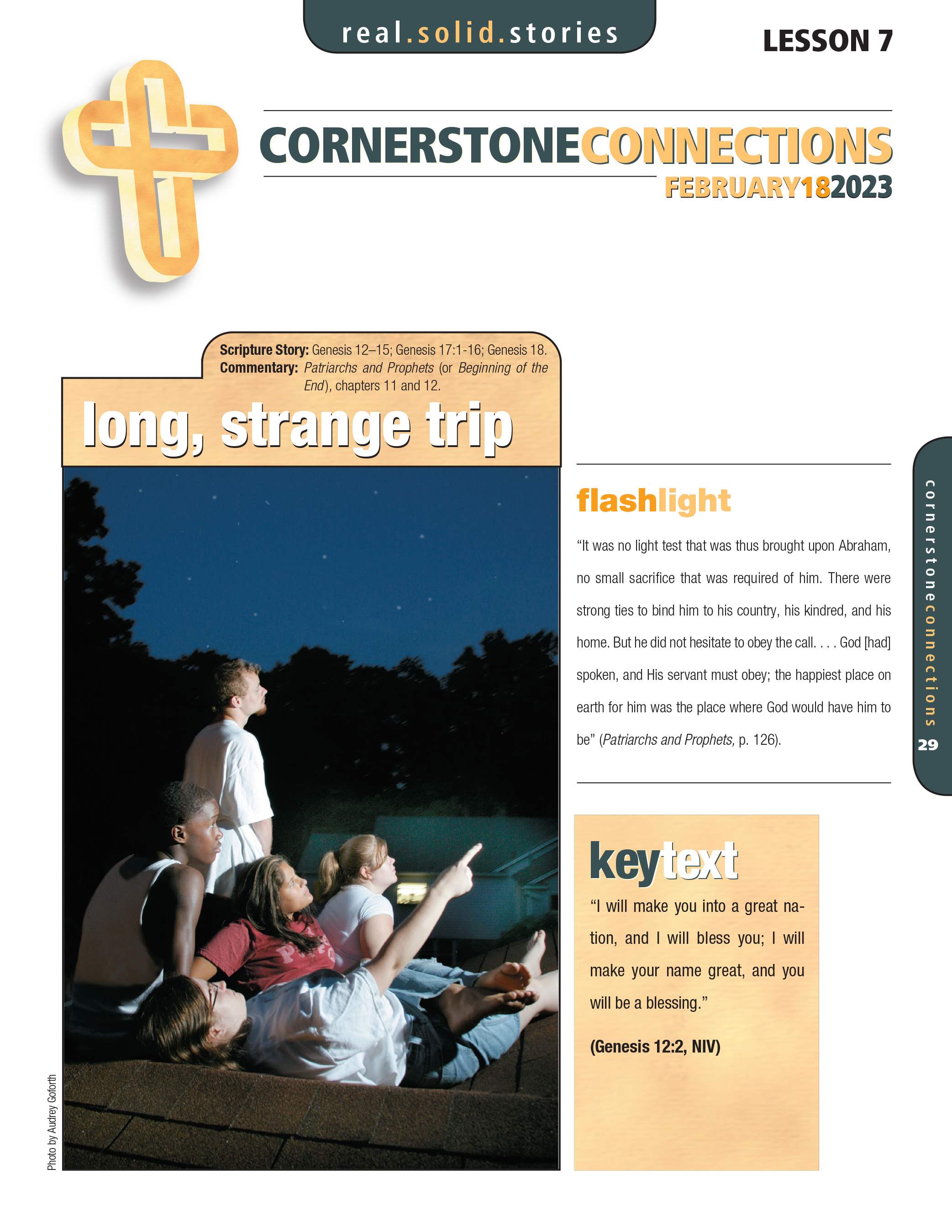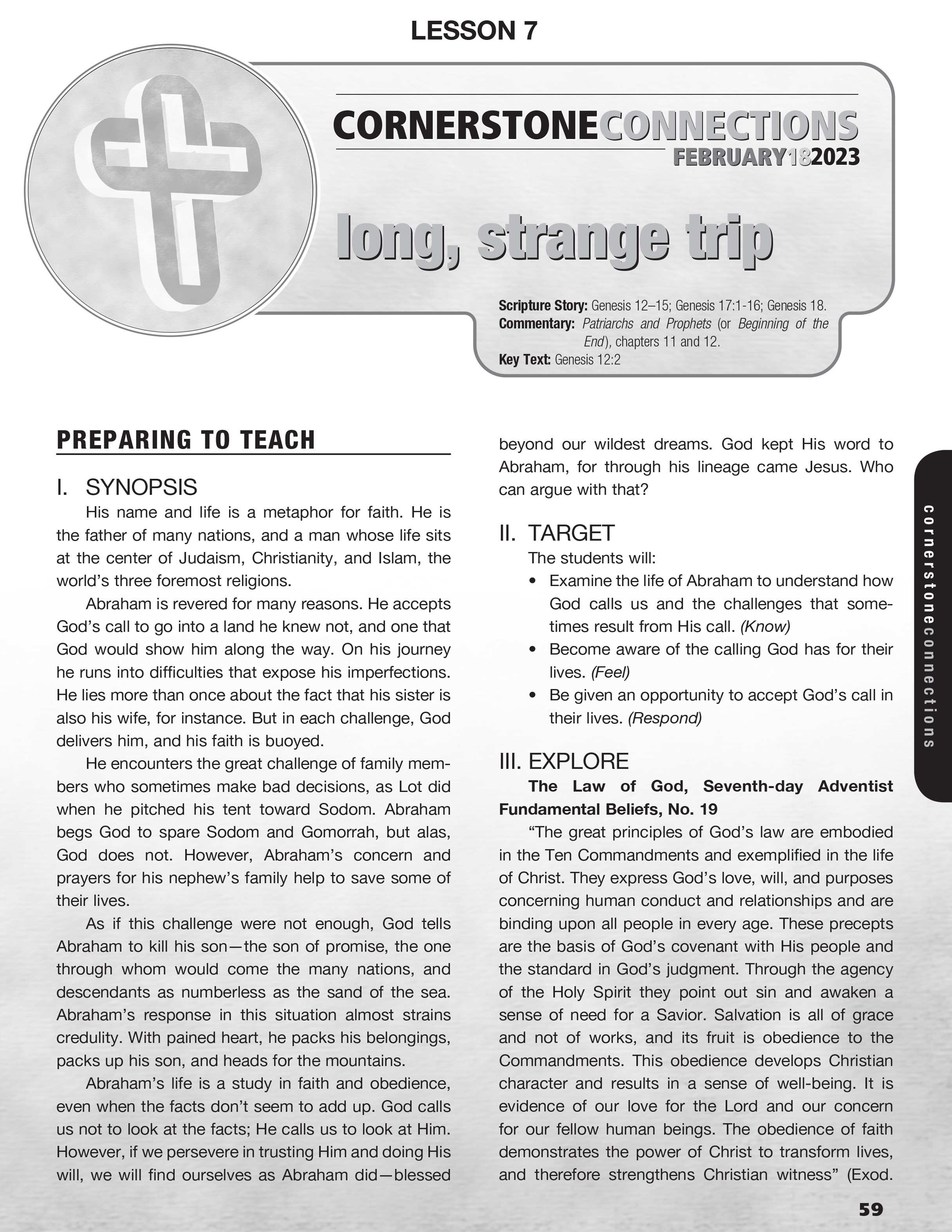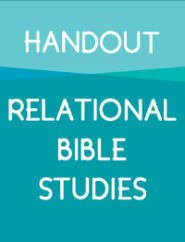Long, Strange Trip
Click below to download the Cornerstone Connections leader’s guide and student lesson. This week’s resources also include two lesson plans and a discussion starter video which offer different ways of looking at the topic. Each lesson plan includes opening activities, scripture passages, discussion questions, and real-life applications.
Abraham’s name is a synonym for, and his life an example of, the kind of faith that God looks for in His friends.
SCRIPTURE PASSAGES
OVERVIEW
Abraham’s name is a synonym for, and his life an example of, the kind of faith that God looks for in His followers.

OPENING ACTIVITY
Supplies needed: Papers, pens/pencils, or just the Notes app on your students’ phones.
Have your students team up in groups of two. Have one student make a packing list for a potential two-week trip. Have the other, without sharing notes, make an itinerary for a two-week trip. When everyone has finished their lists, compare each group’s lists to see how well they match up.
DISCUSSION
TRANSITION
(Leader: You may want to share a personal story of how God has led in your life in unexpected ways.)
Abraham lived a comfortable life in Mesopotamia. In fact, more than comfortable—he was quite wealthy, with a great number of possessions, servants, and animals. He had every reason to stay in Ur, where everything was already working great for him, and every reason not to pack up for a land where famines and wars were far more common. He traded life in comfortable buildings in flourishing cities to live in tents on grassy plains.
So, what gave him such great faith that he’d leave everything behind?
The Bible tells us next to nothing about Abraham’s early years. In Joshua 24, Joshua tells the Israelites, “Long ago your ancestors, including Terah the father of Abraham and Nahor, lived beyond the Euphrates River and worshiped other gods. But I took your father Abraham from the land beyond the Euphrates and led him throughout Canaan and gave him many descendants” (verses 2-3).
Though Abraham was surrounded by idol worshippers, even in his own family, he was one of a few who had kept belief in the one true God. Still, there’s a difference between a religious belief, and a faith you put in action to uproot yourself from everything you’ve ever known. Abraham heard God’s voice, and risked everything to follow it.
Abraham was a wealthy man in every way but one: children. His culture valued large families, and viewed having many descendants as the ultimate goal in prosperity. God’s promise of a child, despite years of failing to conceive, must have filled them with excitement—for a time. But as the years passed by, God’s promise must have started to feel like wishful thinking at best. Did Abraham wonder if he’d imagined God’s voice? Or that this God he followed was leading him on?
BIBLE STUDY GUIDE
There’s a lot happening in this week’s lesson, and you’re unlikely to have time to cover all the texts ahead. You may want to choose one or two to focus on, or simply see how far you get in the lesson before time is up, letting the group discussion go where it may.
Read Genesis 12:1-7.
The Lord had said to Abram, “Go from your country, your people and your father’s household to the land I will show you. 2 “I will make you into a great nation, and I will bless you; I will make your name great, and you will be a blessing. 3 I will bless those who bless you, and whoever curses you I will curse; and all peoples on earth will be blessed through you.”
So Abram went, as the Lord had told him; and Lot went with him. Abram was seventy-five years old when he set out from Harran. 5 He took his wife Sarai, his nephew Lot, all the possessions they had accumulated and the people they had acquired in Harran, and they set out for the land of Canaan, and they arrived there.
Abram traveled through the land as far as the site of the great tree of Moreh at Shechem. At that time the Canaanites were in the land. 7 The Lord appeared to Abram and said, “To your offspring I will give this land.” So he built an altar there to the Lord, who had appeared to him.
DISCUSSION
Half-sister, half-truth
Read Genesis 12:10-20.
Now there was a famine in the land, and Abram went down to Egypt to live there for a while because the famine was severe. 11 As he was about to enter Egypt, he said to his wife Sarai, “I know what a beautiful woman you are. 12 When the Egyptians see you, they will say, ‘This is his wife.’ Then they will kill me but will let you live. 13 Say you are my sister, so that I will be treated well for your sake and my life will be spared because of you.”
When Abram came to Egypt, the Egyptians saw that Sarai was a very beautiful woman. 15 And when Pharaoh’s officials saw her, they praised her to Pharaoh, and she was taken into his palace. 16 He treated Abram well for her sake, and Abram acquired sheep and cattle, male and female donkeys, male and female servants, and camels.
But the Lord inflicted serious diseases on Pharaoh and his household because of Abram’s wife Sarai. 18 So Pharaoh summoned Abram. “What have you done to me?” he said. “Why didn’t you tell me she was your wife? 19 Why did you say, ‘She is my sister,’ so that I took her to be my wife? Now then, here is your wife. Take her and go!” 20 Then Pharaoh gave orders about Abram to his men, and they sent him on his way, with his wife and everything he had.
DISCUSSION
When kings go to war
This short but dramatic (and often-overlooked) story about Abraham is a study in contrasts. The kings join forces, while Abram divides his forces. The enemy armies come to raid and steal, while Abram only joins the battle to save his nephew Lot. When the battle is over, Abram refuses to take any “spoils of war,” and instead gives a tithe to Melchizedek, a priest of the city of Salem, which would one day be called Jerusalem.
Read Genesis 14:1-24. (You may want to read aloud—or summarize—the first seven verses yourself to spare your students the misery of stumbling over so many unknown words.)
At the time when Amraphel was king of Shinar, Arioch king of Ellasar, Kedorlaomer king of Elam and Tidal king of Goyim, 2 these kings went to war against Bera king of Sodom, Birsha king of Gomorrah, Shinab king of Admah, Shemeber king of Zeboyim, and the king of Bela (that is, Zoar). 3 All these latter kings joined forces in the Valley of Siddim (that is, the Dead Sea Valley). 4 For twelve years they had been subject to Kedorlaomer, but in the thirteenth year they rebelled.
In the fourteenth year, Kedorlaomer and the kings allied with him went out and defeated the Rephaites in Ashteroth Karnaim, the Zuzites in Ham, the Emites in Shaveh Kiriathaim 6 and the Horites in the hill country of Seir, as far as El Paran near the desert. 7 Then they turned back and went to En Mishpat (that is, Kadesh), and they conquered the whole territory of the Amalekites, as well as the Amorites who were living in Hazezon Tamar.
Then the king of Sodom, the king of Gomorrah, the king of Admah, the king of Zeboyim and the king of Bela (that is, Zoar) marched out and drew up their battle lines in the Valley of Siddim 9 against Kedorlaomer king of Elam, Tidal king of Goyim, Amraphel king of Shinar and Arioch king of Ellasar—four kings against five. 10 Now the Valley of Siddim was full of tar pits, and when the kings of Sodom and Gomorrah fled, some of the men fell into them and the rest fled to the hills. 11 The four kings seized all the goods of Sodom and Gomorrah and all their food; then they went away. 12 They also carried off Abram’s nephew Lot and his possessions, since he was living in Sodom.
A man who had escaped came and reported this to Abram the Hebrew. Now Abram was living near the great trees of Mamre the Amorite, a brother of Eshkol and Aner, all of whom were allied with Abram. 14 When Abram heard that his relative had been taken captive, he called out the 318 trained men born in his household and went in pursuit as far as Dan. 15 During the night Abram divided his men to attack them and he routed them, pursuing them as far as Hobah, north of Damascus. 16 He recovered all the goods and brought back his relative Lot and his possessions, together with the women and the other people.
After Abram returned from defeating Kedorlaomer and the kings allied with him, the king of Sodom came out to meet him in the Valley of Shaveh (that is, the King’s Valley).
Then Melchizedek king of Salem brought out bread and wine. He was priest of God Most High, 19 and he blessed Abram, saying, “Blessed be Abram by God Most High, Creator of heaven and earth. 20 And praise be to God Most High, who delivered your enemies into your hand.”
Then Abram gave him a tenth of everything.
The king of Sodom said to Abram, “Give me the people and keep the goods for yourself.”
But Abram said to the king of Sodom, “With raised hand I have sworn an oath to the Lord, God Most High, Creator of heaven and earth, 23 that I will accept nothing belonging to you, not even a thread or the strap of a sandal, so that you will never be able to say, ‘I made Abram rich.’ 24 I will accept nothing but what my men have eaten and the share that belongs to the men who went with me—to Aner, Eshkol and Mamre. Let them have their share.”
DISCUSSION
Laughing matters
Read Genesis 18:1-15.
The Lord appeared to Abraham near the great trees of Mamre while he was sitting at the entrance to his tent in the heat of the day. 2 Abraham looked up and saw three men standing nearby. When he saw them, he hurried from the entrance of his tent to meet them and bowed low to the ground.
3 He said, “If I have found favor in your eyes, my lord, do not pass your servant by. 4 Let a little water be brought, and then you may all wash your feet and rest under this tree. 5 Let me get you something to eat, so you can be refreshed and then go on your way—now that you have come to your servant.”
“Very well,” they answered, “do as you say.”
6 So Abraham hurried into the tent to Sarah. “Quick,” he said, “get three seahs of the finest flour and knead it and bake some bread.”
7 Then he ran to the herd and selected a choice, tender calf and gave it to a servant, who hurried to prepare it. 8 He then brought some curds and milk and the calf that had been prepared, and set these before them. While they ate, he stood near them under a tree.
9 “Where is your wife Sarah?” they asked him.
“There, in the tent,” he said.
10 Then one of them said, “I will surely return to you about this time next year, and Sarah your wife will have a son.”
Now Sarah was listening at the entrance to the tent, which was behind him. 11 Abraham and Sarah were already very old, and Sarah was past the age of childbearing. 12 So Sarah laughed to herself as she thought, “After I am worn out and my lord is old, will I now have this pleasure?”
13 Then the Lord said to Abraham, “Why did Sarah laugh and say, ‘Will I really have a child, now that I am old?’ 14 Is anything too hard for the Lord? I will return to you at the appointed time next year, and Sarah will have a son.”
15 Sarah was afraid, so she lied and said, “I did not laugh.”
But he said, “Yes, you did laugh.”
DISCUSSION
Hard bargain
Read Genesis 18:20-33.
20 Then the Lord said, “The outcry against Sodom and Gomorrah is so great and their sin so grievous 21 that I will go down and see if what they have done is as bad as the outcry that has reached me. If not, I will know.”
22 The men turned away and went toward Sodom, but Abraham remained standing before the Lord. 23 Then Abraham approached him and said: “Will you sweep away the righteous with the wicked? 24 What if there are fifty righteous people in the city? Will you really sweep it away and not spare the place for the sake of the fifty righteous people in it? 25 Far be it from you to do such a thing—to kill the righteous with the wicked, treating the righteous and the wicked alike. Far be it from you! Will not the Judge of all the earth do right?”
26 The Lord said, “If I find fifty righteous people in the city of Sodom, I will spare the whole place for their sake.”
27 Then Abraham spoke up again: “Now that I have been so bold as to speak to the Lord, though I am nothing but dust and ashes, 28 what if the number of the righteous is five less than fifty? Will you destroy the whole city for lack of five people?”
“If I find forty-five there,” he said, “I will not destroy it.”
29 Once again he spoke to him, “What if only forty are found there?”
He said, “For the sake of forty, I will not do it.”
30 Then he said, “May the Lord not be angry, but let me speak. What if only thirty can be found there?”
He answered, “I will not do it if I find thirty there.”
31 Abraham said, “Now that I have been so bold as to speak to the Lord, what if only twenty can be found there?”
He said, “For the sake of twenty, I will not destroy it.”
32 Then he said, “May the Lord not be angry, but let me speak just once more. What if only ten can be found there?”
He answered, “For the sake of ten, I will not destroy it.”
33 When the Lord had finished speaking with Abraham, he left, and Abraham returned home.
DISCUSSION

APPLICATION
Abraham is a “hero of faith,” yet he was all too human. His story reminds us that faith is a journey, and each day is an opportunity to grow in our faith. At the same time, God works through and redeems even times when we falter and doubt.
Consider:

SCRIPTURE PASSAGE
LEADER’S NOTE
For a Relational Bible Study (RBS) you’ll want to get into the Scripture passage and encourage the youth to imagine participating in the story while it’s happening. Then you will be able to better apply it to your own situation today.
You will need to ask God for the Holy Spirit to be present as your small group discusses the questions (no more than 3-6 people in a group is recommended). Start with the opening question. It is a personal question and the answer is unique for each individual. There is no right answer and nobody is an expert here, so don’t be surprised when you hear different responses. You are depending on the Holy Spirit to be present and to speak through your group. Say what God prompts you to say, and listen to what others share.
Take turns reading the chapter out loud. Follow that with giving the students some time to individually mark their responses to the questions (a PDF version of the handout is available as a download). This gives each person a starting point for responding when you start to share as a group. Next, begin the discussion by asking the students to share what they marked and why on each question as you work your way through. Feel free to take more time on some questions than others as discussion warrants.
Encourage each person in the group to apply what is discussed to their personal lives and to share with the group what they believe God wants them to do. Then ask them to pray that God will help each of them to follow through in doing so. Remind them to expect that God will show them ways to live out the message of this passage in the coming week, and that they are free to ask others in the group to help hold them accountable.
OVERVIEW
If we had to encapsulate Abram’s entire experience up to this point, we could do it with one word: faith. Sometimes he manifested it, and sometimes he didn’t do as well. Leaving home, having adventures in Egypt, separating from his nephew, entering a war, creating a covenant with God all took a ton of faith! Much of this faith was derived from Abram’s constant communication with God. Now, Abram and Sarai are old (of course, not as old as we would imagine someone in their 90s to be, because the life expectancy was different back then), and they have relied on God for so many things in their life, and yet, there are still times when their faith has failed (i.e. Egypt, Hagar). This is natural of course; they are only human.
However, in Chapter 17, we see that God holds them in immense regard, and their faith has not gone unnoticed. Abram is now 99 years old, and God presents him with the promise that he will be the father of all nations, changing his name to Abraham to reflect it. God promises that the covenant will be everlasting and mark a chosen people. On the flip side, Abraham is to keep up the symbolism of the covenant with the ceremony of circumcision, a procedure done to show the people’s continued obedience and loyalty to God. Furthermore, Sarai is also renamed to Sarah, but unlike Abraham, her name does not change meaning. However, the change in name reflects the establishment of the new nation, as the dialect changes from that of Ur to that of Canaan. As the mother of this new nation, she is the nurturer and symbol of faith and miracles, perhaps one of the most important parts of the covenant with God.
There is much to be said about the specifics of the covenant, the way it carried out into the future, and its personal vs. national ties. However, I would like to focus on Abraham’s response. Even after accepting and understanding the gloriousness of his covenant with God, Abraham, in his human mind, cannot comprehend the extent of the divinity of the covenant: the way God can make the humanly impossible, possible. So, he asks God to do the “logical” thing: bless Ishmael, he will be the start of the nation. Of course, we know what happens, and although Ishmael is blessed tremendously and is a moving force in starting another nation, he is not the designated one to carry on the line of descendants that would eventually render the savior of the world.
Most times in life we feel the need to find the logic (which for day-to-day life is highly important), because that is where our human minds take us. But when dealing with God, when making a covenant with Him, accept the miraculous; let God work within your life, even if you think it's impossible. After all, having a child at 100 years old was possible for Abraham through his faith in God, so accept the logic, but have the faith, and make that covenant with God.
“NAME CHANGE”
What is the biggest change you have experienced in your life so far?
Read Genesis 17:1-16.
When Abram was ninety-nine years old, the Lord appeared to him and said, “I am God Almighty; walk before me faithfully and be blameless. 2 Then I will make my covenant between me and you and will greatly increase your numbers.”
3 Abram fell facedown, and God said to him, 4 “As for me, this is my covenant with you: You will be the father of many nations. 5 No longer will you be called Abram; your name will be Abraham, for I have made you a father of many nations. 6 I will make you very fruitful; I will make nations of you, and kings will come from you. 7 I will establish my covenant as an everlasting covenant between me and you and your descendants after you for the generations to come, to be your God and the God of your descendants after you. 8 The whole land of Canaan, where you now reside as a foreigner, I will give as an everlasting possession to you and your descendants after you; and I will be their God.”
9 Then God said to Abraham, “As for you, you must keep my covenant, you and your descendants after you for the generations to come. 10 This is my covenant with you and your descendants after you, the covenant you are to keep: Every male among you shall be circumcised. 11 You are to undergo circumcision, and it will be the sign of the covenant between me and you. 12 For the generations to come every male among you who is eight days old must be circumcised, including those born in your household or bought with money from a foreigner—those who are not your offspring. 13 Whether born in your household or bought with your money, they must be circumcised. My covenant in your flesh is to be an everlasting covenant. 14 Any uncircumcised male, who has not been circumcised in the flesh, will be cut off from his people; he has broken my covenant.”
15 God also said to Abraham, “As for Sarai your wife, you are no longer to call her Sarai; her name will be Sarah. 16 I will bless her and will surely give you a son by her. I will bless her so that she will be the mother of nations; kings of peoples will come from her.”
Read Genesis 18:1-33.
The Lord appeared to Abraham near the great trees of Mamre while he was sitting at the entrance to his tent in the heat of the day. 2 Abraham looked up and saw three men standing nearby. When he saw them, he hurried from the entrance of his tent to meet them and bowed low to the ground.
3 He said, “If I have found favor in your eyes, my lord, do not pass your servant by. 4 Let a little water be brought, and then you may all wash your feet and rest under this tree. 5 Let me get you something to eat, so you can be refreshed and then go on your way—now that you have come to your servant.”
“Very well,” they answered, “do as you say.”
6 So Abraham hurried into the tent to Sarah. “Quick,” he said, “get three seahs of the finest flour and knead it and bake some bread.”
7 Then he ran to the herd and selected a choice, tender calf and gave it to a servant, who hurried to prepare it. 8 He then brought some curds and milk and the calf that had been prepared, and set these before them. While they ate, he stood near them under a tree.
9 “Where is your wife Sarah?” they asked him.
“There, in the tent,” he said.
10 Then one of them said, “I will surely return to you about this time next year, and Sarah your wife will have a son.”
Now Sarah was listening at the entrance to the tent, which was behind him. 11 Abraham and Sarah were already very old, and Sarah was past the age of childbearing. 12 So Sarah laughed to herself as she thought, “After I am worn out and my lord is old, will I now have this pleasure?”
13 Then the Lord said to Abraham, “Why did Sarah laugh and say, ‘Will I really have a child, now that I am old?’ 14 Is anything too hard for the Lord? I will return to you at the appointed time next year, and Sarah will have a son.”
15 Sarah was afraid, so she lied and said, “I did not laugh.”
But he said, “Yes, you did laugh.”
Abraham Pleads for Sodom
16 When the men got up to leave, they looked down toward Sodom, and Abraham walked along with them to see them on their way. 17 Then the Lord said, “Shall I hide from Abraham what I am about to do? 18 Abraham will surely become a great and powerful nation, and all nations on earth will be blessed through him. 19 For I have chosen him, so that he will direct his children and his household after him to keep the way of the Lord by doing what is right and just, so that the Lord will bring about for Abraham what he has promised him.”
20 Then the Lord said, “The outcry against Sodom and Gomorrah is so great and their sin so grievous 21 that I will go down and see if what they have done is as bad as the outcry that has reached me. If not, I will know.”
22 The men turned away and went toward Sodom, but Abraham remained standing before the Lord. 23 Then Abraham approached him and said: “Will you sweep away the righteous with the wicked? 24 What if there are fifty righteous people in the city? Will you really sweep it away and not spare the place for the sake of the fifty righteous people in it? 25 Far be it from you to do such a thing—to kill the righteous with the wicked, treating the righteous and the wicked alike. Far be it from you! Will not the Judge of all the earth do right?”
26 The Lord said, “If I find fifty righteous people in the city of Sodom, I will spare the whole place for their sake.”
27 Then Abraham spoke up again: “Now that I have been so bold as to speak to the Lord, though I am nothing but dust and ashes, 28 what if the number of the righteous is five less than fifty? Will you destroy the whole city for lack of five people?”
“If I find forty-five there,” he said, “I will not destroy it.”
29 Once again he spoke to him, “What if only forty are found there?”
He said, “For the sake of forty, I will not do it.”
30 Then he said, “May the Lord not be angry, but let me speak. What if only thirty can be found there?”
He answered, “I will not do it if I find thirty there.”
31 Abraham said, “Now that I have been so bold as to speak to the Lord, what if only twenty can be found there?”
He said, “For the sake of twenty, I will not destroy it.”
32 Then he said, “May the Lord not be angry, but let me speak just once more. What if only ten can be found there?”
He answered, “For the sake of ten, I will not destroy it.”
33 When the Lord had finished speaking with Abraham, he left, and Abraham returned home.
SUMMARY
Abram’s covenant with God marks a pivotal step in the story of the redemption of humanity. However, many times we tend to regard it as a piece of history, considering a wonderful testament of the miraculous works of God, and the Old Testament covenant between God and His people (circumcision). Nonetheless, we fail to recognize that this covenant is active today. It is a living and breathing act that forms the central part of our lives as Christians: our communication and faith with our Savior on a personal level. Life brings tremendous challenges, change, and impossibility, and it is natural for that to be the journey of your spiritual life as well. Faith is not a linear journey, and it is entirely an individual one. However, it is God’s fondest wish that whenever we see the next roadblock, the next impossibility, we look to Him, to our covenant, and clutch onto the faith that we may have (even the faith of a mustard seed is good enough according to Matthew 17:20), and we will be amazed at the results, just as Abraham was!

APPLICATIONS
The covenant of Abraham with God may be considered an outdated one, but its lessons and effects carry on to our lives today, especially in our individual walks with God as modern-day youth. It is always a necessary part of studying to sit back and meditate on how a story or lesson applies to us today. Below you will find three applications that can benefit the youth in your group and help them meditate on the Word shared today. These applications work both individually and in a group.
Every name has a meaning, and a reason why that meaning was chosen. Our names, in many ways, define us (considering it’s usually one of the first things people know about us!).
There are a lot of things that are impossible to us as human beings, and many questions that, if given the chance, we would ask God, such as, “How did this happen?” This is of course natural, and a part of human nature. The wondrous part is that God, as our Creator, can quite literally make the impossible possible! We just need to have faith. How does such a faith start?
Change is a powerful force in life, one that can make or break so many items in the delicate balance that makes up each of our experiences. Therefore, change can be a daunting thing. For Abram and Sarai, it was no small feat to leave their home in search of a “Promised Land,” and it was even harder for them to believe that they would one day father a nation when they had no children together. Changes can put a lot of strain or gain into one’s relationship with God, and you can decide which one it will be.





